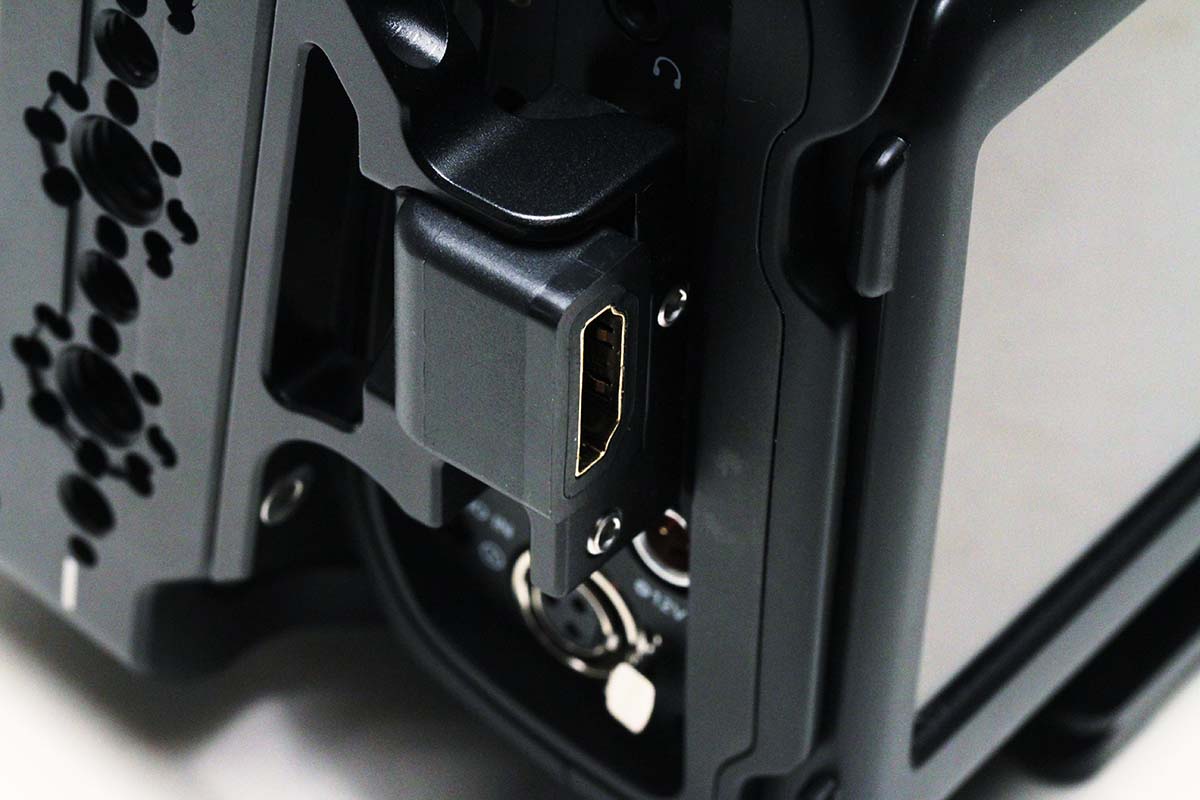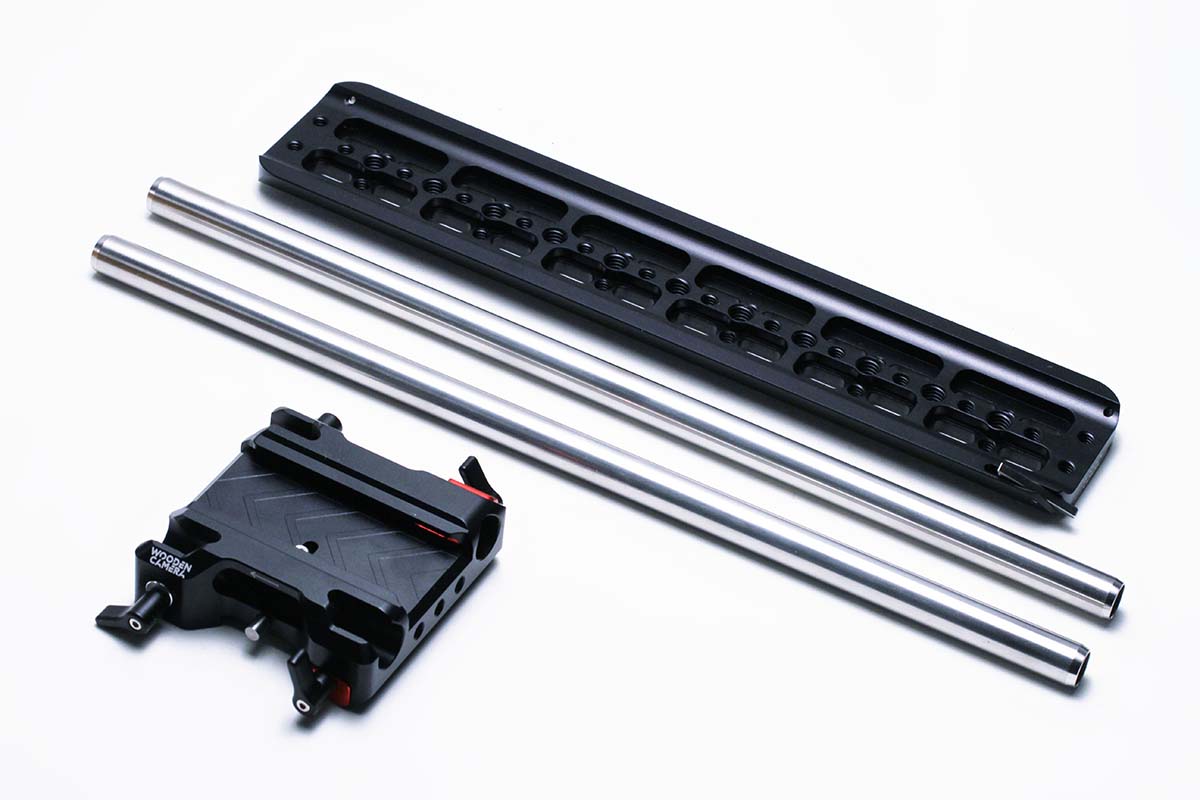Phil Rhodes takes a look at Wooden Camera's latest cage accessory system for the Blackmagic Design Pocket Cinema Camera 6K Pro.
Anyone who’s picked up the pro variant of Blackmagic’s 6K pocket camera will have quickly remarked that, despite its excellence, it is not notable for its pocket-portable compactness. It’s smaller than an Ursa Mini, certainly, and packs some interesting features, not least the internal motorised ND assembly. Even so, it’d be quite reasonable for someone to propose that there might perhaps be better ways of mounting it, and of mounting things on it. Wooden Camera to the rescue!
The collection of equipment shown here is built around Wooden Camera’s 6K Pro camera cage. It’s available separately for $349, or as part of four packages, all of which include the top handle and 15mm rods. The base package ($847) adds a lightweight 15mm baseplate to connect cage and 12” rods, equipped with a quick-release dovetail intended for small fluid-head tripods. The Advanced version includes an eight-inch Arri-compatible dovetail to handle larger camera support gear, while the top-of-the-range Pro option ($1526) has a longer twelve-inch dovetail, 15” rods and a rod-supported battery mount, available to suit either gold or V-mount batteries.
First impressions
The cage design, which sits at the centre of everything, leverages the fact that the 6K Pro itself has two threads on the bottom and one on the top, so this particular cage bolts very securely in place. It’s much sturdier than some DSLR cages which have tried to use the flash shoe as a mounting point; Wooden Camera’s design is very solid. It smothers the camera in useful 1/4”-20 and 3/8”-16 cheese plates, and the design even thinks to put an angled cold shoe on the camera’s left shoulder, something that’s likely to find use as a microphone mount. A right-angled HDMI adaptor is supplied and functions as a very welcome way to protect the camera’s video output connector, being restrained in place by a carefully-machined aperture in the cage.

The HDMI adaptor is held firmly in place by the cage, though the power connector still sticks out sideways

The top handle is a bit of a surprise; it’s a much nicer to grab the camera and go, to a degree that’s actually quite surprising, and the balance can be fine-tuned at least a little, the better to suit various lens and battery combinations. None of this tries to improve handheld behaviour, although it does provide ample opportunity to add a dovetail-mounting shoulder pad or front grips and perhaps somewhere to bolt on a loupe viewfinder.
The rest of the package is relatively straightforward and will be chosen by any user based very much on the use case involved; rods are rods; a dovetail is a dovetail. The build quality, though, is very high. The cage itself is machined in a single piece, screws glide into place, and the black anodised finish is flawless. The battery mount on the rod-mounting electronics module is Anton-Bauer branded, as we might expect given the Vitec connection, and operates with a smooth positivity that some of the cheaper options might lack.

These come with the Pro edition of the kit, with 15-inch rods and a 12-inch dovetail. For some that'll be too much.

The top-level Pro package, reviewed and pictured here, with the longer 12” dovetail and 15” rods, will be too much for many 6K Pro users. With a stills-derived lens on an EF mount, there’s a need to shuffle the rods around until the battery stops colliding with the back of the dovetail. Anyone using a 6K Pro with really large PL lenses will be happy, though, and the ability to spread things out makes for a stabler package on the shoulder.
Design
If there’s one design misstep, it’s perhaps the way the battery mount cables to the side of the camera. The power output on the battery mount is at the bottom, and the supplied cable has a right-angled connector only at the battery end. That connector only misses the left-hand rod in some fairly specific combinations of tilt and upward travel; if the connector had been a quarter of an inch to the right, it would have been much more flexible. Given the amount of work done to get the HDMI connector angled backwards, it also seems an odd choice to leave the camera-end power connector sticking out sideways.
Otherwise, the only issue is the fact that the 6K Pro is built to the same almost DSLR-esque layout as Blackmagic’s earliest cameras. While it has hinged screen, putting the control panel on the back inevitably makes the camera an awkward bedfellow with a battery mounted, well, where batteries usually go. In this case, the best approach is possible to hinge the screen out to aim more or less upward, so the camera can be controlled from above. Given a traditional AC-operator pairing that means it’s equally accessible to either, so long as they’re both tall enough.
The only other thought that occurs is perhaps a new product suggestion. Wooden Camera also makes a very smart add-on module for the Ursa Mini Pro series which adds 12V power outputs, Arri-compatible run-stop, and a proper XLR power connector. The idea of a similar bolt-on module for the 6K Pro cage, breaking out everything including the miniature audio XLRs on the camera to standard connectors, might be attractive to just the sort of high-end market the big dovetails and the long rods seem calculated to satisfy. Something for the future, perhaps.
Conclusions
Wooden Camera’s 6K Pro cage is a neat and tidy way to bring the camera into a higher-end environment. It’s not excessively heavy, it fits like a glove and it is extremely well made. But for the fleeting awkwardness of that essentially rear-mounted control panel, which isn’t really something Wooden Camera can do much about, it’s a solid solution. Particularly, the configurability is great – you can buy any of the subassemblies independently, and the cage, in particular, will find a lot of use in situations where people need to attach the 6K Pro camera to things, even in the absence of the rest of it.
In the end, perhaps the general impression is most important. Modern camera rigging can create something that looks like a sprawling monstrosity. This, once you add the mattebox, just looks like a camera.